
Can your project management strategy predict the future? 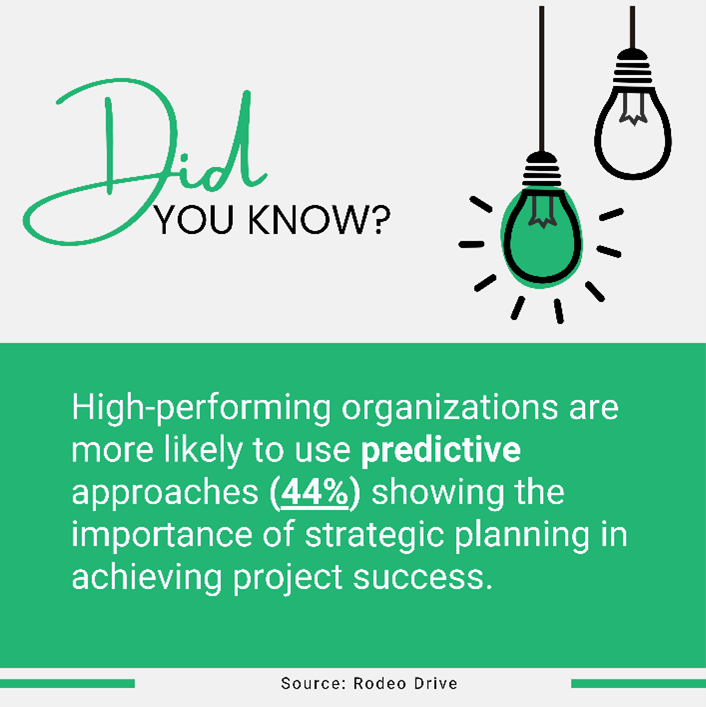 Imagine knowing potential project risks before they occur, optimizing resources, and ensuring on-time project delivery with unprecedented accuracy. This is the promise of predictive project management.
Imagine knowing potential project risks before they occur, optimizing resources, and ensuring on-time project delivery with unprecedented accuracy. This is the promise of predictive project management.
Predictive project management leverages advanced data analytics and machine learning to forecast project outcomes, enabling proactive decision-making. This approach transforms traditional project management by anticipating risks, optimizing resource allocation, and enhancing overall project efficiency. This article summarizes the key aspects of predictive project management, the role of data, technologies used, benefits, implementation strategies, industry applications, and future trends. It also highlights how TrueProject, a leading predictive project management SaaS solution, enhances project health and performance through advanced warning systems, predictive intelligence, and AI-driven insights.
Understanding Predictive Project Management
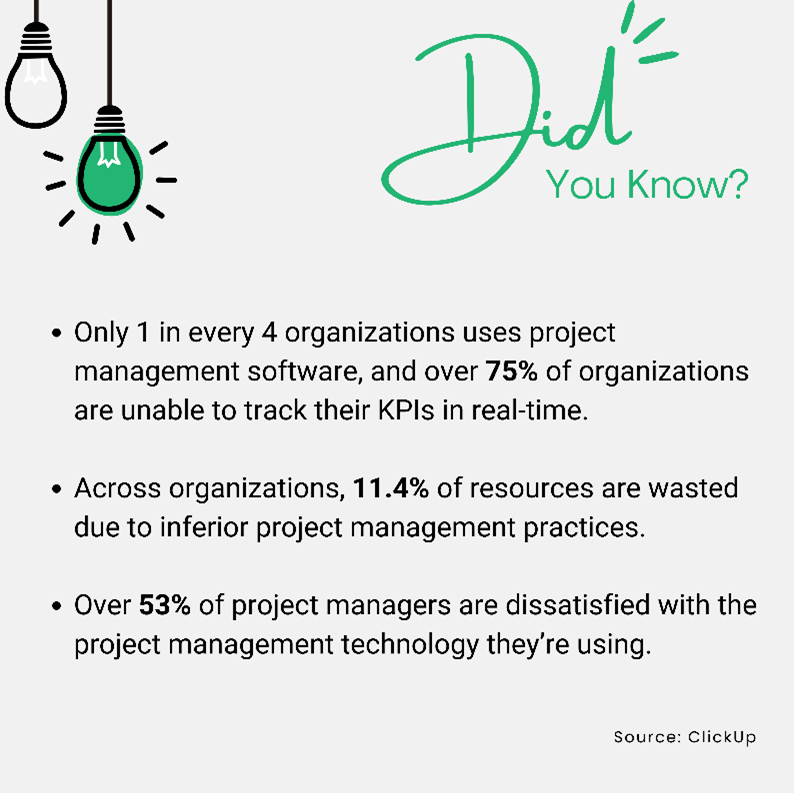 Over 60 percent of projects face failure, leading to increased costs, delays, or unmet objectives. There are currently few tools that effectively predict project failures and provide risk mitigation strategies. Predictive Project Analytics tackles these challenges, enabling organizations to assess project complexity in relation to the maturity of their governance models and control mechanisms, thus identifying and preventing potential failures.
Over 60 percent of projects face failure, leading to increased costs, delays, or unmet objectives. There are currently few tools that effectively predict project failures and provide risk mitigation strategies. Predictive Project Analytics tackles these challenges, enabling organizations to assess project complexity in relation to the maturity of their governance models and control mechanisms, thus identifying and preventing potential failures.
Predictive project management uses historical data, statistical algorithms, and machine learning techniques to predict future project outcomes. This approach enables project managers to foresee potential challenges and proactively mitigate risks. The evolution from traditional to predictive methods marks a significant shift in project management, providing a data-driven foundation for decision-making and strategy formulation.
Predictive project management uses various analytical techniques to forecast potential outcomes based on historical data. By leveraging these tools, project managers can gain insights into potential risks and opportunities, enabling them to make informed decisions that enhance project outcomes. Given that only 15% of project managers are dedicated to a single project, the majority handle multiple projects simultaneously, often managing between 5 and 10 projects at once. This is where predictive project management software becomes invaluable, providing a comprehensive overview of all ongoing projects.
The Role of Data in Predictive Project Management
Data is the backbone of predictive project management. It involves collecting relevant data from various sources, analyzing it to identify patterns, and using these insights to forecast future project performance. Effective data collection and analysis enable project managers to make informed decisions, ensuring projects stay on track and within budget.
For instance, predictive analytics can help project teams understand resource utilization patterns, identify potential bottlenecks, and optimize project schedules. Real-world examples highlight the importance of data in driving project success, showcasing how data-driven decisions can significantly improve project outcomes. According to Project Practical, data integration and real-time analytics are crucial for enhancing decision-making and improving project performance.
The Project Management Triangle below illustrates the scope, cost, time, and quality trade-offs. In predictive project management, scope is fixed, while cost, time, and quality are variables that adjust to meet project goals. Conversely, in Agile project management, the scope is variable to maintain fixed cost, time, and quality.
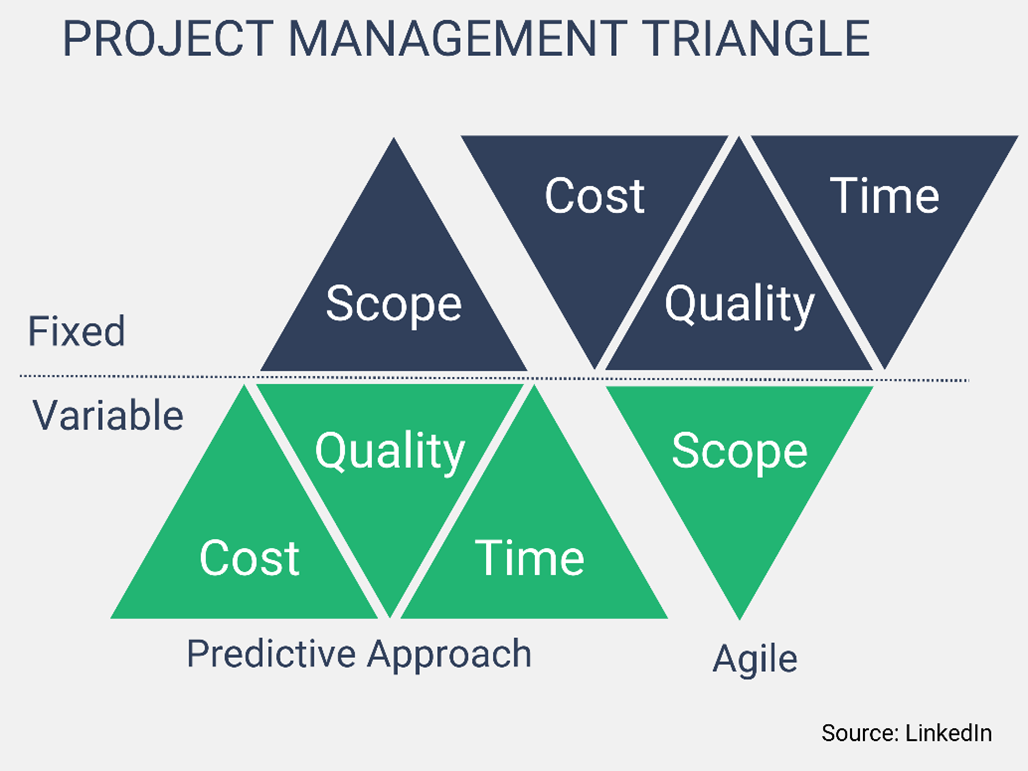
Technologies for Predictive Project Management
Several technologies, including advanced software solutions and AI-driven platforms, support predictive project management. These advanced analytical solutions analyze project data, provide real-time insights, and automate various aspects of project management.
Key technologies include:
- AI and Machine Learning - These technologies enhance predictive capabilities, enabling more accurate forecasts and proactive risk management. AI-driven tools analyze vast amounts of data to identify patterns and predict future outcomes.
- Data Integration Platforms - Tools that consolidate data from multiple sources, providing a comprehensive view of project performance. These platforms enable seamless data integration, ensuring that project managers have access to accurate and up-to-date information.
- Real-Time Analytics - Platforms that offer real-time data analysis, helping project managers make timely and informed decisions. Real-time analytics provide immediate insights into project performance, enabling proactive adjustments to keep projects on track.
Using solutions equipped with these technologies, project managers can streamline project execution, optimize resource allocation, and enhance overall project efficiency. For example, predictive analytics tools can help identify potential risks early, allowing project managers to mitigate these risks and avoid project delays proactively.
Benefits of Predictive Project Management
Organizations must stay competitive and reduce costs in the changing global economic landscape. Replacing outdated technology, improving business processes, and implementing new programs are essential to meet these demands. Capabilities to manage project risk and guarantee effective governance, supported by powerful analytical insights, are crucial for achieving project and business transformation success. Here are the benefits of leveraging predictive project management, including: 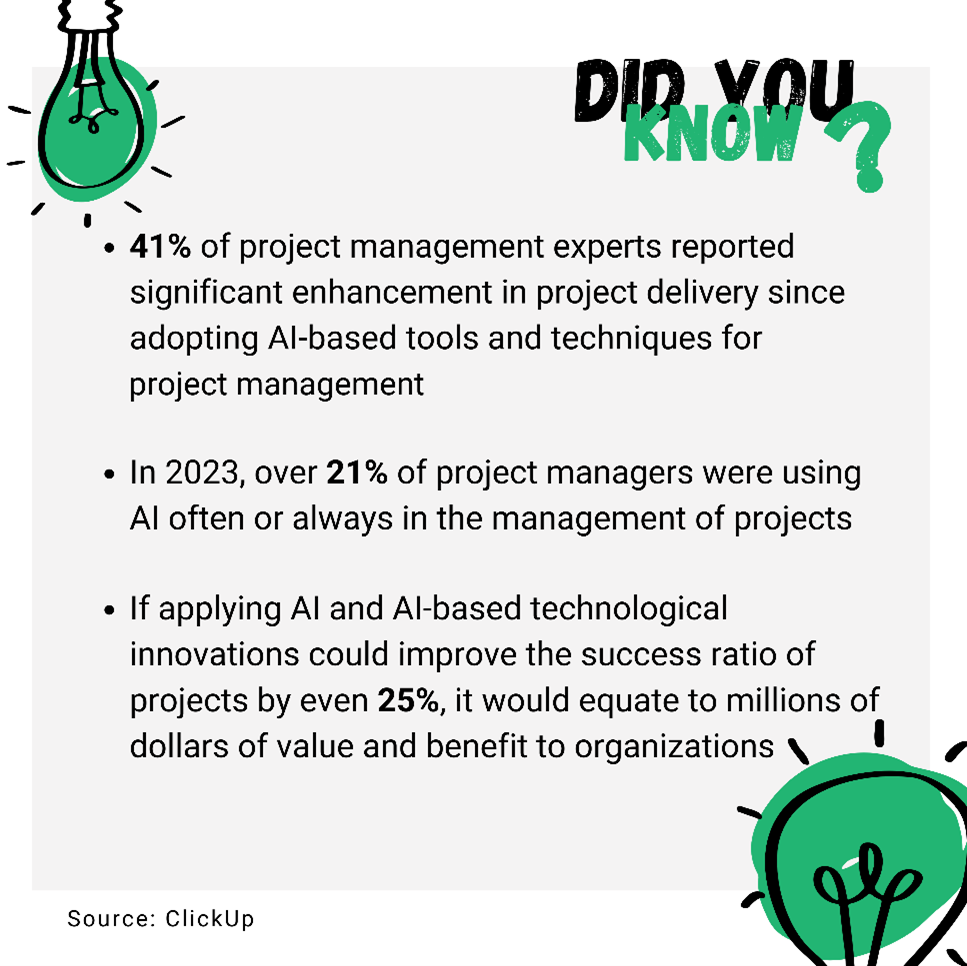
- Risk Mitigation: Identifying potential risks early allows for timely interventions, reducing the likelihood of project failure. Predictive analytics can highlight potential issues before they escalate, enabling project teams to address them proactively.
- Resource Optimization: Efficiently allocating resources based on predictive insights ensures optimal use and minimizes waste. Predictive project management tools can analyze resource utilization patterns and recommend adjustments to improve efficiency.
- Cost Control: Accurate cost forecasting helps maintain budgets and avoid financial overruns. By analyzing historical data, predictive analytics can provide accurate cost estimates, helping project managers stay within budget.
- Improved Decision Making: Data-driven insights enhance decision-making processes, leading to better project planning and execution. Predictive analytics give project managers the information they need to make informed decisions that drive project success.
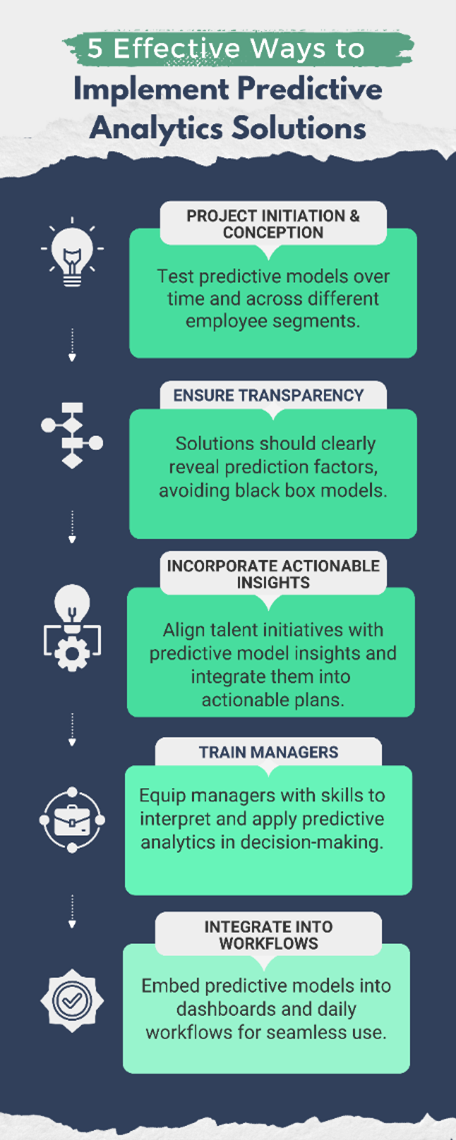
Implementing Predictive Project Management
Implementing predictive project management requires a structured approach. Here’s what you must consider:
- Starting with Data Collection: Gather relevant historical data and establish data collection processes. Ensure that data is accurate and comprehensive, as the quality of the data will impact the accuracy of predictive analytics.
- Choosing the Right Tools: Select tools and technologies that align with project needs and integrate seamlessly with existing systems. Evaluate different predictive analytics platforms to determine which one best meets the needs of your project team.
- Training and Adoption: Ensure project teams are trained to use predictive tools effectively, fostering a culture of data-driven decision-making. Provide ongoing training and support to help team members become proficient with predictive analytics tools.
- Overcoming Challenges: Address common obstacles such as data quality issues and resistance to change by promoting the benefits and providing adequate support. Communicate the advantages of predictive project management to stakeholders to gain buy-in and support for implementation.
To successfully implement predictive project management, project teams must prioritize data accuracy, select the right tools, and ensure that team members are adequately trained. By taking a structured approach to implementation, project managers can maximize the benefits of predictive analytics and enhance project outcomes.
Predictive Project Management in Different Industries
Predictive project management is applicable across various industries, including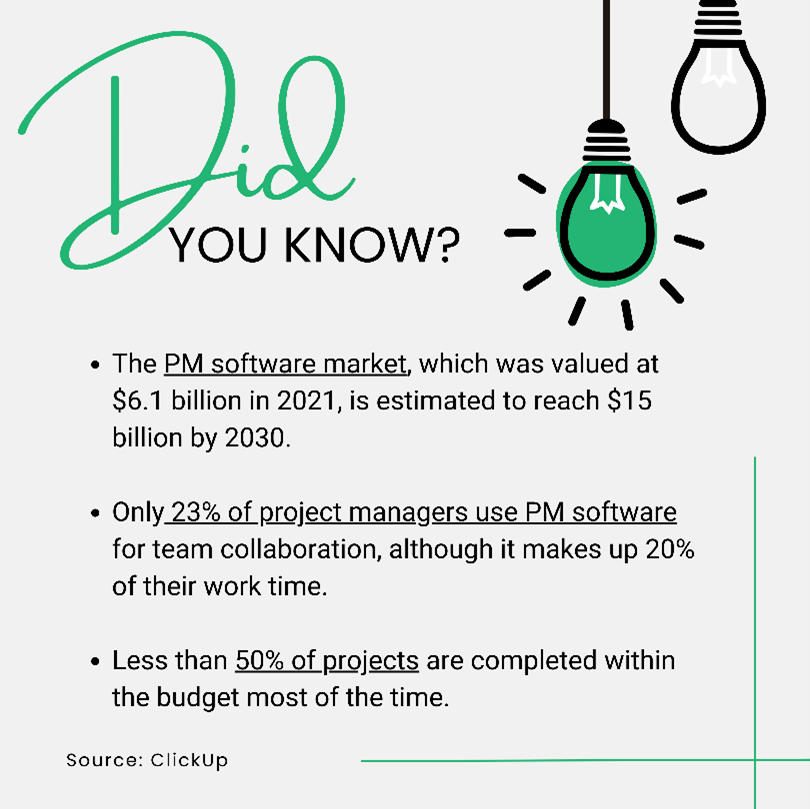 :
:
- Construction - Enhancing project delivery by predicting delays and optimizing resource allocation. Predictive analytics can help construction project managers identify potential risks, such as supply chain disruptions or weather-related delays, and take proactive measures to mitigate these risks.
- IT and Software Development - Improving agility and reducing time-to-market through better risk management and scheduling. Predictive project management tools can analyze project data to identify potential bottlenecks and recommend adjustments to improve project timelines.
- Healthcare - Managing complex projects with precision, ensuring timely completion and compliance with regulations. Predictive analytics can help healthcare project managers anticipate potential issues, such as regulatory changes or resource shortages, and adjust project plans accordingly.
- Manufacturing - Streamlining processes and reducing waste by leveraging predictive insights for better decision-making. Predictive project management tools can analyze production data to identify inefficiencies and recommend process improvements.
By leveraging predictive analytics, project managers in various industries can enhance project outcomes, improve resource utilization, and ensure timely project completion. Predictive project management provides valuable insights that enable project teams to make informed decisions and optimize project performance.
Future Trends in Predictive Project Management
Emerging technologies and evolving practices shape the future of predictive project management. Here are some key trends that will define the future landscape:
- Integration with IoT - IoT devices provide real-time data, enhancing predictive analytics' accuracy by monitoring conditions, tracking assets, and identifying potential issues early.
- Blockchain for Data Security - Blockchain ensures data security and transparency, enabling tamper-proof record-keeping and building trust among stakeholders.
- Advanced AI and Machine Learning - Enhanced AI and machine learning algorithms improve risk prediction, data analysis, and project outcome forecasting.
- Real-Time Collaboration Tools - These platforms facilitate better team communication and coordination, integrating with predictive analytics for instant project status updates.
- Agile and Lean Methodologies - These methodologies increasingly use predictive analytics for better planning and execution, focusing on continuous improvement and adaptability.
- Sustainability Focus - Predictive project management promotes sustainability by optimizing resource usage and minimizing environmental impact.
- VR and AR Technologies - VR and AR provide immersive project planning and visualization, improving stakeholder engagement and design accuracy.
- Data-Driven Decision-Making - Organizations are adopting data-driven cultures, leveraging predictive analytics to guide strategies and improve project outcomes.
- Predictive Maintenance - Predictive analytics anticipate maintenance needs, reducing downtime and optimizing asset management.
- Regulatory Compliance - Tools help navigate regulatory environments, predicting compliance issues and ensuring adherence to regulations.
By staying ahead of these trends, project managers can leverage predictive analytics to drive innovation and improve project performance.
Conclusion
Predictive project management represents a significant advancement in the field, offering project leaders and decision-makers a powerful solution to enhance project outcomes. By leveraging data analytics and machine learning, organizations can anticipate challenges, optimize resources, and ensure successful project delivery. As the landscape of project management continues to evolve, embracing predictive project management will be crucial for staying competitive and achieving long-term success. Predictive project management is not just a trend; it's a necessity for modern project execution. Leaders who adopt this approach will be better equipped to navigate the complexities of today's project environments, ensuring their projects are completed on time, within budget, and to the highest quality standards.
Leveraging modern predictive SaaS solutions is imperative to deliver projects with optimal outcomes. TrueProject stands out as a leader in predictive project management SaaS solutions. This KPI-based platform improves project health and performance by automating project oversight and governance. TrueProject uses advanced warning, predictive intelligence, and AI to identify potential project issues before they become critical, ensuring your projects stay on track and within budget. Its historical data analysis and AI-automated assessments provide targeted, contextualized feedback, bringing teams together by providing a single source of truth. This unified view across the project enhances seamless operations, optimizes resource allocation, and drives successful project outcomes. By choosing TrueProject, project leaders can benefit from comprehensive insights, proactive risk management, and enhanced collaboration, setting their projects on the right track for success.
More information on TrueProject at trueprojectinsight.com

About the Author:
Nisha Antony is an accomplished Senior Marketing Communications Specialist at TrueProject, a leader in predictive intelligence. With over 16 years of experience, she has worked as a Senior Analyst at Xchanging, a UK consulting firm, and as an Internal Communications Manager on a major cloud project at TE Connectivity. She is an insightful storyteller who creates engaging content on AI, machine learning, analytics, governance, project management, cloud platforms, workforce optimization, and leadership.
Endnotes:
- PMO Team. “Project Management Statistics and Trends in 2024.” ClickUp: Jun 12, 2024. https://clickup.com/blog/project-management-statistics/
- Elissa Farrow. “10 Emerging Project Management Trends In 2024.” International Institute for Learning: Dec 23, 2023. https://blog.iil.com/10-emerging-project-management-trends-in-2024/
- Antara Sharma. “Predictive vs Adaptive Project Management — What’s your pick?” LinkedIn: Nov 18. https://www.linkedin.com/pulse/predictive-vs-adaptive-project-management-whats-your-pick-sharma/





